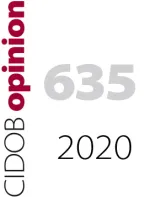The COVID juncture

At the end of March 2020, a third of the world's population was living in lockdown. More people were subject to exceptional measures imposed to combat a global pandemic than lived through the Second World War. Its geographical scope, temporal simultaneity and social, political and economic impact may make COVID-19 the fundamental experience of 21st century global society.
COVID-19 is a paradigmatic and yet exceptional example of a “critical juncture”, a concept that identifies crucial moments of change. In biology it concerns the evolution of a species; in sociology it describes institutional transformation. In Political Science, it is a relatively circumscribed period of time characterised by strong political agencyand the relaxing of the structural determinants of political action. A critical juncture is distinguished from the periods before and after it by the increased number of options available to political actors and the greater impact of their choices. It is a window of time when the (historically) possible bursts into the realm of events and produces a new horizon of feasible solutions. In short, a chance arises for extraordinary change.
According to Mark Blyth, a thoughtful reader of Polanyi, the magnitude and direction of this change are determined in the realm of ideas. During a critical juncture, hegemonic beliefs, thoughts and paradigms are up for discussion. The new needs the crisis produces bring antagonistic and hitherto marginal approaches into play, which are then filtered by a vibrant political–institutional fabric. With COVID-19 we have seen this clearly. Since the outbreak of the pandemic, various belief systems and conceptual frameworks have fallen into crisis, while the tensions and power relations that underlie them have been called into question.
The relationship between the public and private is one example of this. In the Financial Times Philip Stephens put it very clearly, the pandemic: "has reframed the role of the state [...] It is no longer quite so obvious that the answer to every economic policy dilemma is to let markets decide". The historic agreement reached last July by the European Union confirms this: the monetary value of time is no longer the only imperative. Market dictates seem to have given way to public needs – in the more concrete sense of a welfare state– as well as to new solutions in terms of economic policies.
Another system of ideas called into questioned by the pandemic is predicated on the us/them division. The health emergency has laid bare the artificiality and dangerousness of what has been one of the main categories of contemporary thought, showing that, in order to be effective, a public policy needs to reach the population as a whole, without distinguishing by class or nationality, and without exclusions. The same logic applies to countries: domestic lockdown measures without coordination and solidarity between states lose their effectiveness when borders reopen.
Finally, COVID-19 has short-circuited the relationship between reason and emotion that has dominated the political scene in recent decades, dissipating populist mirages. The tragedies in the United States and Brazil, to mention two of the most obvious cases, show that propaganda and symbolic politics don’t work against a pandemic. The solution inevitably involves a commitment to research and development, reliable data, and basing measures on empirical evidence.
COVID-19 is an exceptional critical juncture. This means that we are experiencing an unprecedented crisis. But it also means that we are at a particularly ripe moment for change, when the decisions made will be critical to determining the future that awaits us. The direction and magnitude of this change remains uncertain and will largely depend on which belief system wins the battle of ideas. Several critical fronts are open, among them the three dilemmas posed above: the relationships between the public and private, between us and them and between reason and emotion. My hope is that our experiences in this exceptional 2020 provide lessons for regaining the public, reviving solidarity and rescuing reason.
Keywords: COVID-19, crisis, pandemic, juncture, Political Science, beliefs, public-private, us-them, symbolic politics
E-ISSN: 2013-4428
D.L.: B-8439-2012